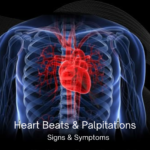Understanding Heart Intolerance: Causes, Symptoms, and Management
Heart intolerance, a term less commonly known but increasingly relevant, refers to the heart’s reduced ability to withstand stress or functional demands. This condition often presents in individuals with underlying cardiovascular issues or those experiencing symptoms that mimic other cardiac conditions. Understanding heart intolerance is crucial for early detection, appropriate management, and improved patient outcomes.
What is Heart Intolerance?
Heart intolerance, sometimes referred to as cardiac intolerance, is a condition where the heart struggles to cope with physical or emotional stress. This can lead to a range of symptoms that impact an individual’s quality of life. Unlike heart failure, where the heart’s pumping ability is significantly impaired, heart intolerance may involve subtler dysfunctions that affect the heart’s response to increased demands.
Causes of Heart Intolerance
Several factors can contribute to the development of heart intolerance:
1. Underlying Cardiovascular Diseases
- Coronary Artery Disease (CAD): CAD, characterized by narrowed or blocked coronary arteries, can limit blood flow to the heart muscle, reducing its ability to function optimally under stress.
- Hypertension: Chronic high blood pressure forces the heart to work harder, potentially leading to hypertrophy and decreased efficiency in handling increased demands.
- Heart Valve Disorders: Conditions such as aortic stenosis or mitral valve prolapse can alter the heart’s ability to pump blood effectively, leading to symptoms of intolerance.
2. Lifestyle Factors
- Sedentary Lifestyle: Lack of regular physical activity can weaken the heart muscle, making it less capable of handling physical exertion.
- Poor Diet: Diets high in saturated fats, trans fats, and sodium can contribute to the development of atherosclerosis and hypertension, both of which can lead to heart intolerance.
- Smoking and Alcohol Consumption: These habits can damage the cardiovascular system, reducing the heart’s functional capacity.
3. Psychological Stress
- Chronic Stress: Prolonged exposure to stress can lead to elevated levels of cortisol and adrenaline, which may strain the heart and lead to intolerance.
- Mental Health Disorders: Conditions such as anxiety and depression can manifest physical symptoms that impact heart function.
4. Medical Conditions
- Diabetes: Poorly controlled diabetes can lead to diabetic cardiomyopathy, a condition where the heart muscle becomes impaired.
- Thyroid Disorders: Both hyperthyroidism and hypothyroidism can affect heart rate, rhythm, and overall cardiovascular health.
- Chronic Kidney Disease: Kidney dysfunction can lead to fluid and electrolyte imbalances, affecting heart function.
Symptoms of Heart Intolerance
The symptoms of heart intolerance can vary widely and may overlap with other cardiac conditions. Common symptoms include:
- Fatigue: Persistent tiredness, even after minimal exertion, is a hallmark of heart intolerance.
- Shortness of Breath: Difficulty breathing, especially during physical activity or stress, can indicate the heart’s struggle to meet increased oxygen demands.
- Chest Discomfort: Pain or discomfort in the chest, often described as tightness or pressure, can occur with heart intolerance.
- Palpitations: Irregular or rapid heartbeats may be experienced, particularly during periods of stress or physical activity.
- Dizziness or Lightheadedness: Reduced blood flow can cause feelings of faintness, especially upon standing or exertion.
Diagnosing Heart Intolerance
Diagnosing heart intolerance involves a comprehensive approach that includes:
1. Medical History and Physical Examination
- Detailed History: Gathering information about symptoms, lifestyle, medical history, and family history of cardiovascular disease.
- Physical Exam: Assessing vital signs, listening to heart sounds, and evaluating physical responses to stress.
2. Diagnostic Tests
- Electrocardiogram (ECG): An ECG can detect irregular heart rhythms and other electrical abnormalities.
- Echocardiogram: This ultrasound of the heart can reveal structural issues and assess the heart’s pumping function.
- Stress Tests: Exercise or pharmacological stress tests measure the heart’s response to increased physical demands.
- Blood Tests: Assessing biomarkers such as cholesterol, blood glucose, and thyroid function can provide insights into underlying conditions.
Managing Heart Intolerance
Effective management of heart intolerance involves a combination of lifestyle modifications, medical interventions, and, in some cases, psychological support.
1. Lifestyle Modifications
- Regular Exercise: Engaging in moderate aerobic exercise can strengthen the heart and improve its ability to handle stress. Activities such as walking, cycling, and swimming are beneficial.
- Healthy Diet: A diet rich in fruits, vegetables, whole grains, lean proteins, and healthy fats can support cardiovascular health. Reducing sodium, saturated fats, and trans fats is crucial.
- Stress Management: Techniques such as mindfulness, meditation, and yoga can help manage psychological stress, reducing its impact on the heart.
2. Medical Interventions
- Medications: Depending on the underlying cause, medications such as beta-blockers, ACE inhibitors, and diuretics may be prescribed to manage symptoms and improve heart function.
- Monitoring and Follow-up: Regular check-ups with a healthcare provider are essential to monitor progress and adjust treatment plans as needed.
3. Psychological Support
- Counseling and Therapy: For individuals with significant psychological stress or mental health disorders, counseling or therapy can be beneficial.
- Support Groups: Joining support groups for people with similar conditions can provide emotional support and practical advice.
Conclusion
Heart intolerance is a condition that can significantly impact an individual’s quality of life if left unaddressed. Understanding its causes, recognizing the symptoms, and implementing effective management strategies are crucial for improving outcomes. By adopting a holistic approach that includes lifestyle changes, medical interventions, and psychological support, individuals with heart intolerance can lead healthier, more fulfilling lives. If you suspect you have heart intolerance, consult a healthcare professional for a comprehensive evaluation and personalized treatment plan.





